Table of Contents
Podcasts continue to rise in popularity.
According to the New York Times, 1 out of 3 people listen to at least one podcast every month. Last year, it was more like one in four.
As marketers, we can capitalize on this.
- Start your own podcast
- Get featured on other people’s podcast
This article is going to focus on the latter – I’m going to give you the exact process I use to get featured on dozens of podcasts.
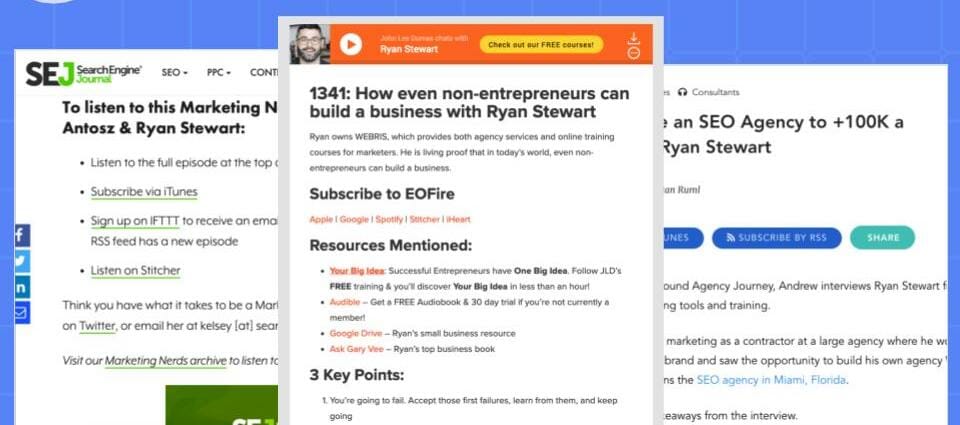
Why get featured on podcasts?
- A great way to increase exposure for your brand and/or product
- They’re a great way to build high quality links for SEO
- Fantastic networking tool to connect you with influencers in your industry
- The conversion rates are insane – audiences are highly engaged
However, getting interviewed on podcasts is not easy – you need a strong pitch. On top of that, getting featured on 1 won’t move the needle – both for exposure and link equity.
You need to build a podcast outreach engine. Here’s a look at mine 👇
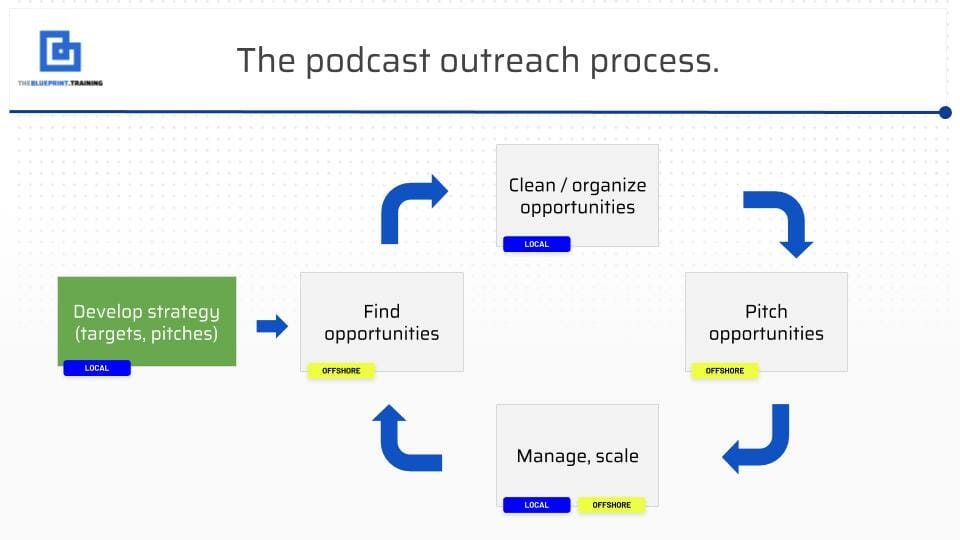
This process breaks down into a few simple steps:
- Strategy – developing your outreach plan, identifying targets and writing your outreach pitches.
- Prospecting – finding each podcast opportunity and recording it in a Google Sheets file.
- Cleaning – reviewing the opportunities and cleaning to leave only the most relevant ones.
- Pitching – sending the pitch emails to each opportunity.
- Managing – playing project manager to respond to emails and ensure podcasts appointments get set.
We break down how to build a low cost outreach team at scale inside The Blueprint Training.
I cover a lot more ground in the video…I strongly suggest you watch it 👇
1. Podcast outreach strategy
In order to get featured on a podcast, you need to be interesting.
You need to understand what interesting means for differing industries (i.e. pitching for an attorney vs an ecommerce store).
“Interesting” comes in a number of ways:
- Having clout. Are you (or your client) well known? Social following? Important in certain circles? Are you funny?
- Having a story to tell. Overcame something crazy in life? Built a business against all odds? A lot of people may find that interesting and relatable.
- Unique point of view to present (data). Being able to present unique findings to an audience.
- Expert in a given field. If you’re an attorney, naturally, you’ll want to target podcasts about law, but if you’re clever you can pivot into podcasts about business, entrepreneurship, etc.
With an understanding of what’s interesting, you can start to formulate a value proposition (aka the pitch).
How to write a podcast pitch 📝
After we have our strategy, we’re going to have to write a pitch [or a series of pitches].
Here’s a few things to keep in mind:
- List out accolades or pieces of interest (essentially a bio to list out all possible pitch angles).
- Build a “platform” based on what you can offer. Whether it’s an interesting piece of data or a story about how you started your business, that can be your platform.
- Get straight into the point. In the first two sentences, you should tell people who you are and why you’re contacting them. The third sentence should be what it is that you can do for them.
- Write different pitch angles according to the type of podcast niche you’re targeting. For example, instead of limiting your pitch to a finance podcast targeted to single mothers, you can craft another pitch to prospect for a bunch of finance podcasts targeted to entrepreneurs as well.
Bam. Now you can take that and scale that out across as many niches that you can think of.
Here’s the exact pitch I use:
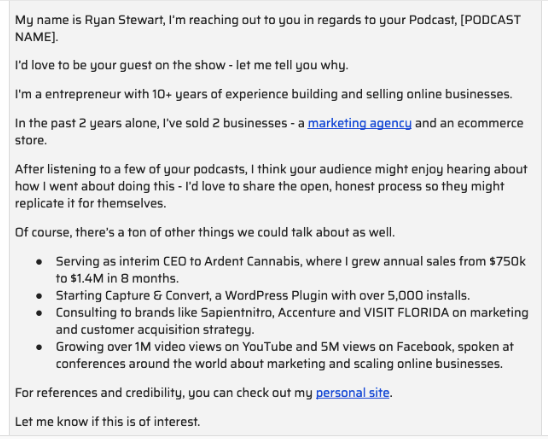
PLEASE DON’T COPY AND PASTE IT – you’ll only hurt yourself.
This pitch is straight to the point, contains my “platform,” and lists out a bunch of accolades.
This is the exact same type of pitch that landed me on the Search Engine Journal podcast.
By now, you should have a strategy for the types of podcasts you’ll find and the value proposition you’ll pitch them. We can move on to the next step in the process – finding podcasts to pitch.
2. Prospecting for podcasts
You can use a number of platforms…I use listennotes.com – it’s a podcast search engine.
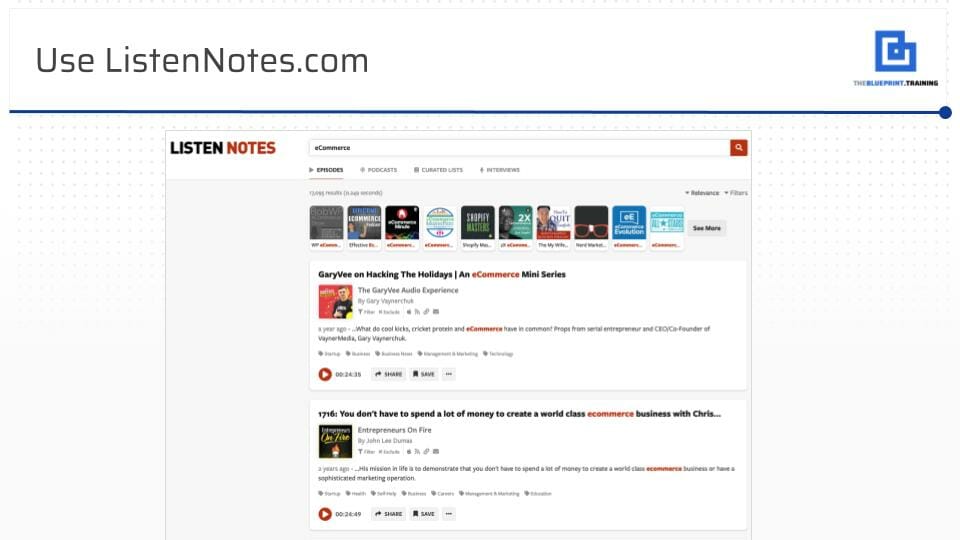
Finding opportunities is simple – just take your niche keywords from the previous step and search for them in Listen Notes.
For example, when I do outreach for myself, I use keywords like:
- Business
- Entrepreneurship
- Marketing
I like to outsource this work as it’s tedious and not a good use of my time.
I’ve built a small team in Philippines off of upwork.com ($3-$6 / hour) whose only job is to find podcast (and other link) opportunities and record them in a spreadsheet.
Here is what they’re instructed to do, step-by-step:
- Take your prospecting keywords (aka business, entrepreneurship, marketing just mentioned)
- Search them on listennotes.com
- Find shows and read about them to see if they’re a good fit
- If they are, they grab their website link and email and record it into our spreadsheet

After we build this list of potential podcasts to pitch to, we have to filter and clean them out.
3. Clean and organize the opportunities
It’s important to filter out this list make sure that the people listed would actually want to hear from us and we’re not annoying them.
When cleaning the prospects file:
- Remove anyone that’s too big. For example, Gary Vee. It’s probably better to get on a bunch of podcasts before pitching to bigger podcasts, but I put him in there because you never know.
- Remove anyone that doesn’t do interviews on their show. We don’t want to contact people to interview us if they don’t actually interview people.
- Remove people that wouldn’t be receptive to the pitch (most often it’s people who aren’t in the niche we prospected for).
I like for our prospectors to record the opportunities into a “scratch” file (below).
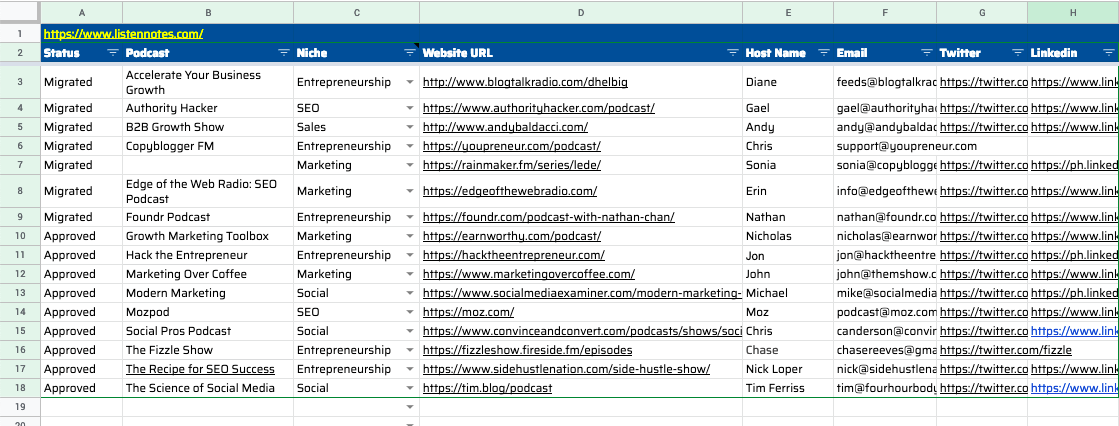
After I clean them, I migrate them into our agency’s automated outreach tracking file (below).
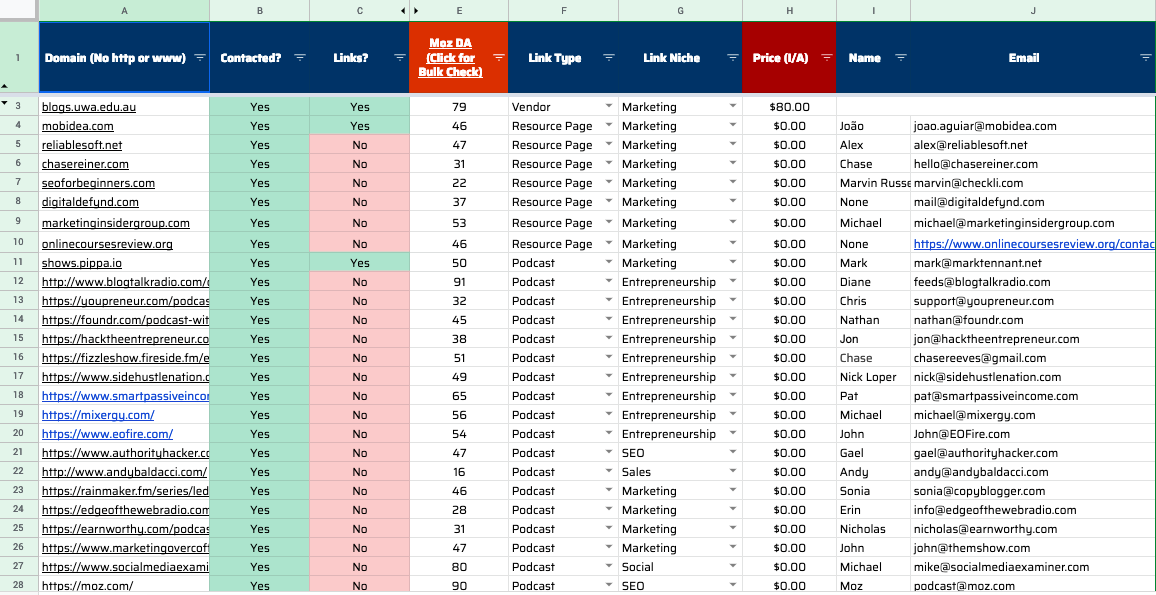
Our file helps us to track and manage mass outreach campaigns. We’re doing this at scale and we don’t want to contact the same website twice – it erodes our brand.
After we’ve gone through cleaning those prospects and migrating them into our project management file, we start to send the pitch.
4. Pitching podcast opportunities
You can send each pitch one by one using Gmail Canned Responses, or you can automate your outreach using Pitchbox.
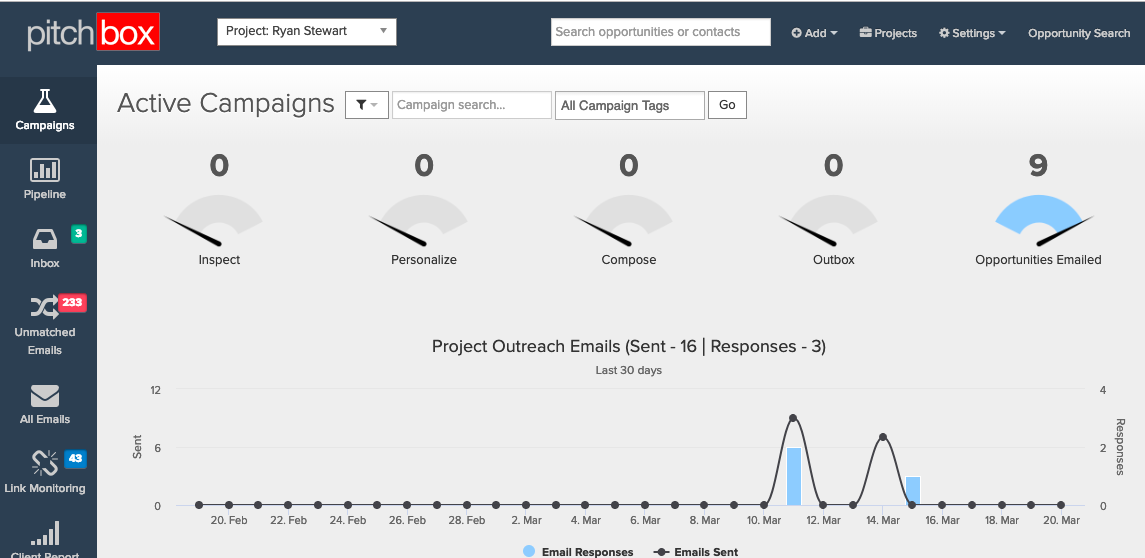
I highly suggest you use Pitchbox because…well…why do more work than you have to? If you’re serious about outreach, Pitchbox is by far the best solution.
Whatever tool you use, it’s important to launch campaigns based on the podcast’s niche.
In the previous step I mentioned how I prospected for podcasts for myself, in the following niches:
- Business
- Entrepreneurship
- Marketing
The topics discussed on podcasts about entrepreneurship are different than those discussed on marketing podcasts. If you want to increase your success rate, you should have pitches that cater to various niches.
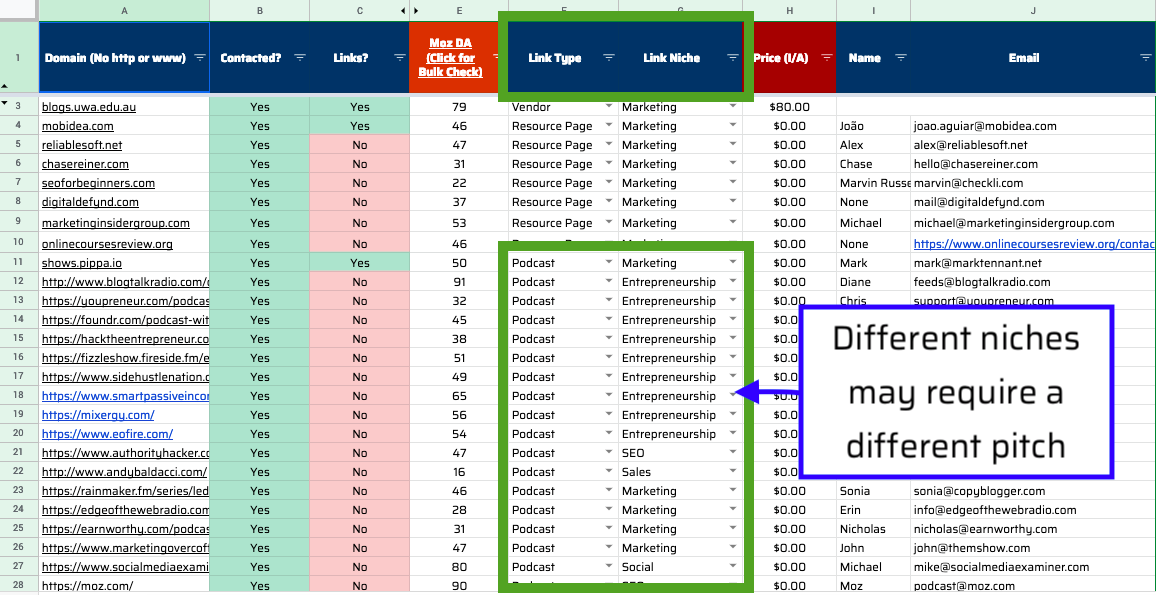
If you’re using our tracking files, this is easy to manage (see above).
You can do that simply by just creating duplicate campaigns in Pitchbox and uploading different pitches.
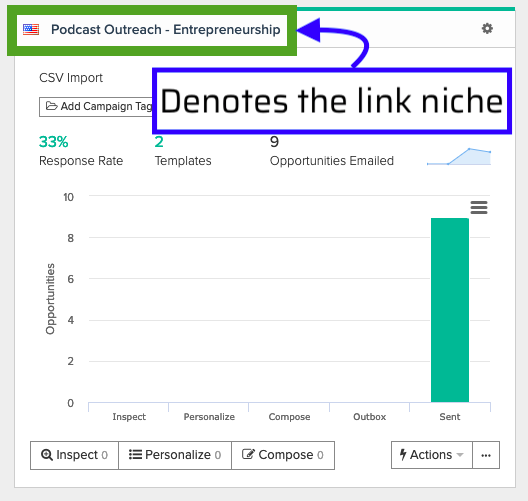
All you have to do is upload your prospects via CSV, drop the pitch in that you wrote, and Pitchbox will take care of the rest, including automated follow-up emails.
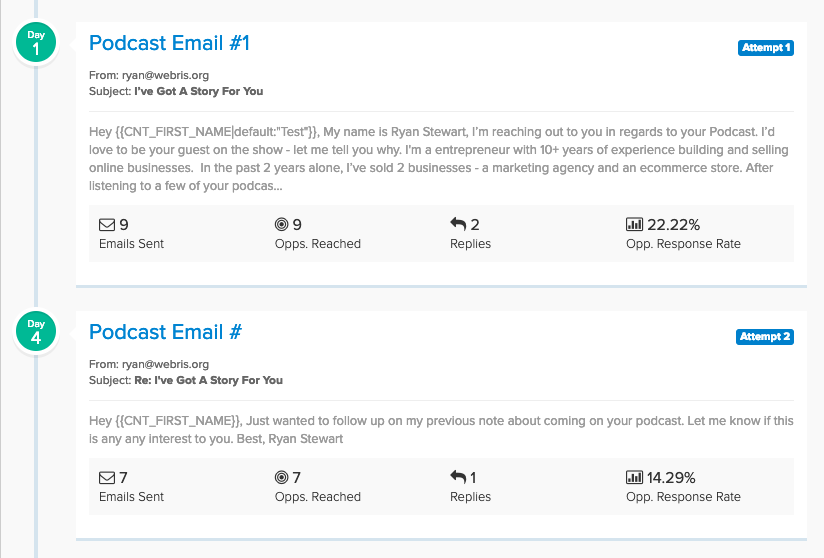
Note: You should be sending pitches from an email that’s attached to your domain (i.e., george@marketing.com) because it gives that extra level of trust and credibility.
5. Manage and scale your campaigns
We use our Our Google Sheets project management system to track the progress of campaigns.
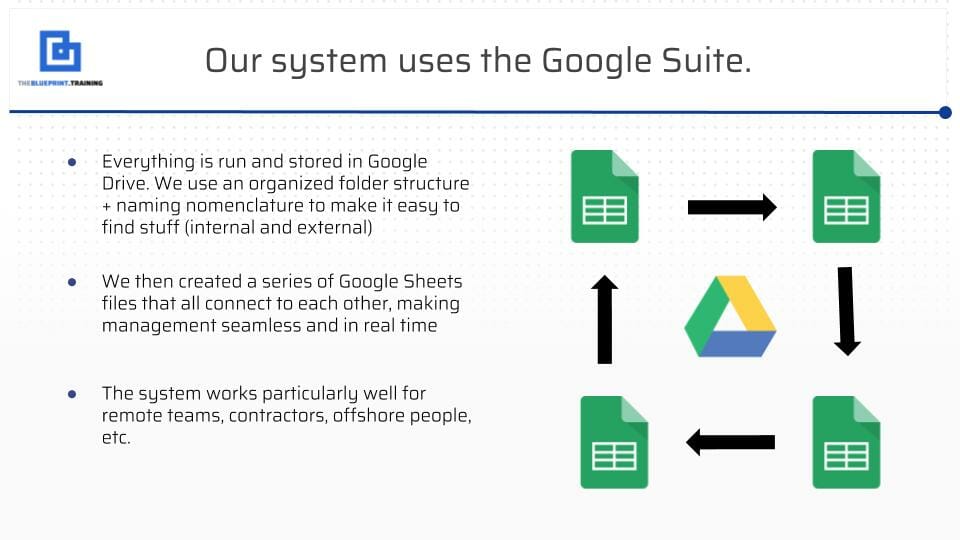
This system is what allows us to scale outreach across all of our agency’s clients (and our own internal brands).
Below is a screenshot from a sample project plan built for podcast outreach.

You can see how all the steps covered in this post are simplified into a handful of tasks and assigned to members of my team.
- Alex is my strategist. He’s the one who builds the prospecting keywords, writes the pitches and oversees the whole process.
- Azhi is our link prospector. She goes out and she finds 200 broadcast opportunities (which Alex goes back and cleans).
- David is my outreach manager – he sends the pitches, manages email responses and updates the project plans.
I’m able to sit back and focus on growing my businesses.
Wrapping It Up
As with most things, you won’t be successful overnight. Keep in mind that a lot of podcasters will say no if you don’t have a track record of appearances on other shows. Start by pitching smaller podcasts with less reach to build a track record before taking on the big guys.
With one under your belt, you can start pitching to other podcasters. I send the podcast I did on EOFire to speaking opportunities all the time, even though it’s a bit older now, the host did a great job and it serves as a good link.
As always, if you have any questions or comments, drop them in the comments below.

